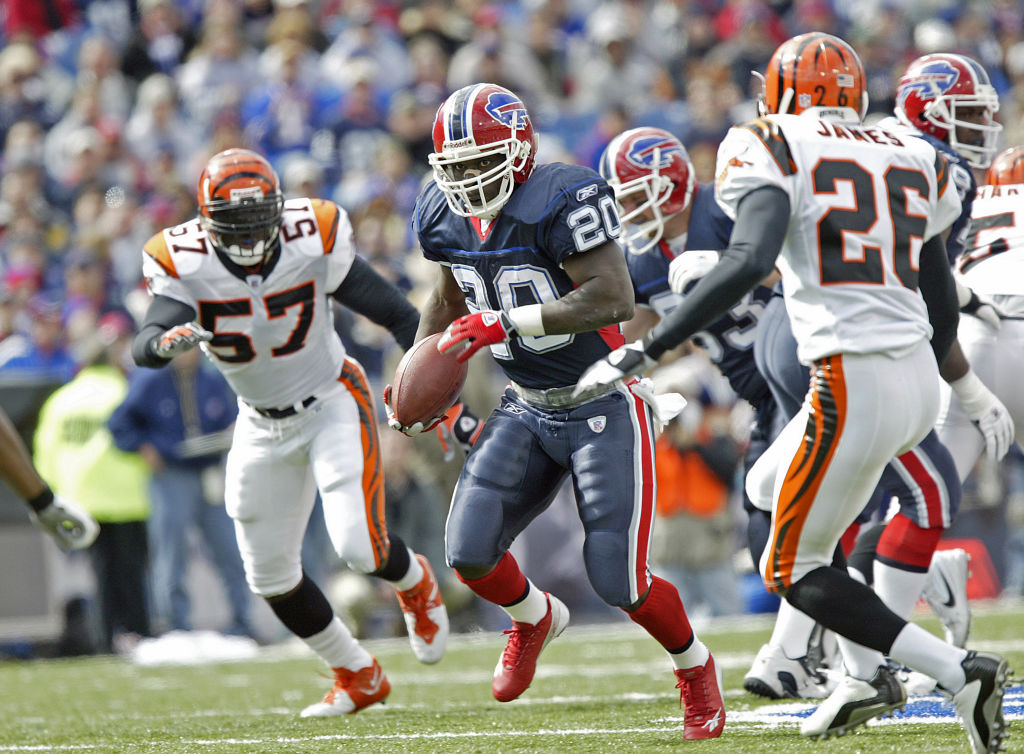NFL
Former Bills Star Travis Henry Went From Being Suspended for Marijuana to Going to Jail for Trafficking Cocaine

Nearly two decades ago, Travis Henry looked like the NFL’s next great running back. A dominant runner with underrated receiving chops, he made the Buffalo Bills look wise for drafting him. Yet, the former University of Tennessee star fell from grace and never lived up to his All-Pro potential. As it turns out, the father of 11 kids spent more time running into trouble than the end zone due to marijuana and cocaine.
Travis Henry was a star for the Bills
RELATED: There’s a Fatal Flaw in Buffalo Bills Great Jim Kelly’s Bold Prediction
In an age where pounding the rock still mattered, Travis Henry ranked as one of the NFL’s best backs. The Bills selected the former SEC standout after in the second round of the 2001 NFL draft. That running back class also featured LaDainian Tomlinson and Deuce McCallister. Early on, it looked like Buffalo scored a huge bargain in landing Henry with the 58th overall pick.
As a rookie, the 5-foot-9, 215-pounder ran for 729 yards and four touchdowns while hauling in 22 passes for 179 yards. By his second season, however, Travis Henry took his game to the next level. He started all 16 games (which he never did again) and totaled 1,438 rushing yards and 13 TD. He also set a career-high with 43 catches. That terrific 2002 campaign resulted in the only Pro Bowl nod of his career.
Though he missed one game in 2003, Henry actually averaged more rushing yards per game (90.4) than he did the year prior. He also hit double-digit rushing touchdowns. However, the Bills’ best offensive weapon lasted just one more year in Orchard Park. Buffalo used its 2003 first-round pick on Willis McGahee. Henry refused to be relegated to backup duties and got traded to the Tennessee Titans.
Marijuana derailed his NFL career
Ironically, Travis Henry ended up serving as a backup anyways to Chris Brown. He did take over starting duties in 2006 and responded with a 1,200-yard campaign. Despite his success as the team’s top back, Henry got cut by the Titans. He landed in Denver, but the Broncos never got the best from the veteran. Injuries limited to Henry to just seven starts in 2007. Yet, his off-field issues, specifically with marijuana, ended up costing him his NFL career.
Having served a four-game drug-related suspension already as a member of the Titans, Henry ran into trouble again when he reportedly tested positive for marijuana during his first year in Denver. He ended up winning his appeal. According to The Ledger, he then missed three drug tests. In May 2008, he tested positive for marijuana for the third time. The Broncos cut him the next month.
In August, he got suspended for one year by the NFL for violating the league’s substance-abuse policy. However, that suspension set the stage for much bigger drug-related problems for Travis Henry.
Henry went to prison for cocaine trafficking
RELATED: Former Dallas Cowboy Sam Hurd Ran a Multimillion-Dollar Drug Ring While Playing in the NFL
Despite making millions for carrying a football, Henry got involved in another business venture: trafficking cocaine. Before his NFL suspension concluded, he found himself in front of Chief U.S. District Judge Richard Cebull. According to the Billings Gazette, Henry received a three-year federal prison sentence and five years of supervised release for financing a cocaine trafficking operation. His marijuana use even came up in court.
“You’re addicted to marijuana. And marijuana is what put you behind that podium today,” Cebull said.
According to the report, Henry participated in the cocaine operation for two years. He got caught in September 2008 as part of an undercover sting. Henry reportedly provided money for drug deals and paid for other expenses such as airline tickets and car rentals. Besides the drug charges, Henry also faced child support disputes in two states.
Henry’s attorney, Harvey Steinberg of Denver, sought leniency, saying Henry had been “duped” and “lured” into the situation by his co-defendants and taken advantage of financially. The athlete had been suffering severe emotional and mental distress about being cut from the Broncos and his “overwhelming financial obligations,” he said.
In 2012, after serving two years in prison, the NFL reinstated Travis Henry. He never played in the league again.











